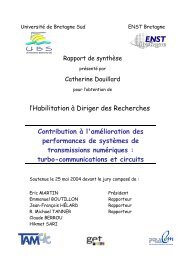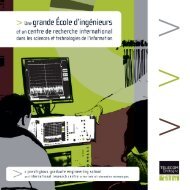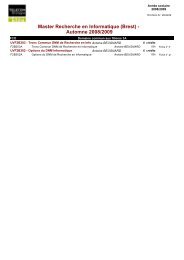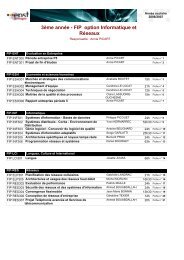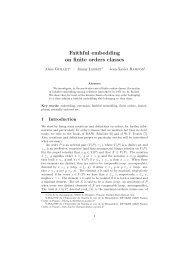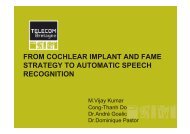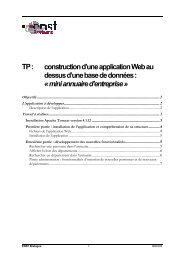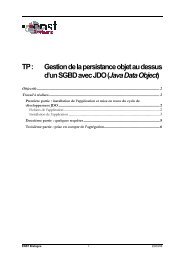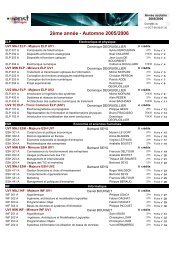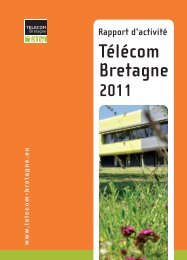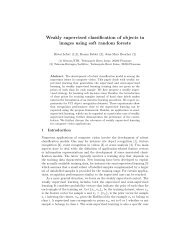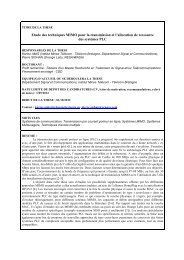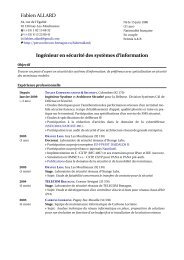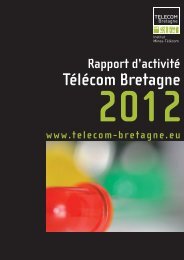researResearch - Télécom Bretagne
researResearch - Télécom Bretagne
researResearch - Télécom Bretagne
You also want an ePaper? Increase the reach of your titles
YUMPU automatically turns print PDFs into web optimized ePapers that Google loves.
esearc<br />
<strong>researResearch</strong><br />
Evaluation / Improving processes<br />
A research lecturer from the LICIP project is a<br />
reviewer for the Spice Enterprise project which is<br />
drawing up general reference data for company<br />
processes integrating all existing reference data.<br />
The first draft was completed in November 2008.<br />
Teaching and innovative pedagogy<br />
Computer science and internet certificate<br />
(C2i)<br />
The C2i (http://www2.c2i.education.fr)- Certificat<br />
Informatique et Internet – is a national operation<br />
with the aim of objectivizing skills in the use of<br />
ICT (information and communication<br />
technologies) among our students. This should<br />
ensure, first, that students in higher education<br />
have sufficient IT skills to successfully complete<br />
their course. Furthermore, several C2i-level 2s<br />
are now proposed (or in the process of being<br />
completed) to guarantee that future graduates<br />
possess those skills deemed indispensable for<br />
whatever professional branch they may be<br />
working in.<br />
In 2007/2008, our work consisted mainly in<br />
establishing links with the SDTICE 1 authorities<br />
of the French Ministry of higher education and<br />
research so that Telecom <strong>Bretagne</strong> should<br />
become a member of the operation. Our status<br />
as public establishment of higher education<br />
operating within the French LMD system<br />
(bachelor’s degree, master’s degree and<br />
doctorate) made this possible. Thus we were<br />
authorised to use the national C2i-1 platform and<br />
to implement positioning tests.<br />
One of the LICIP project members, as official C2i<br />
correspondent for the school, participated in<br />
several meetings of the national C2i-1 network.<br />
In 2008, he became part of the C2i-2 panel of<br />
experts, Engineering professions. More<br />
particularly, he took part in drawing up one of the<br />
5 skills referentials - "Problems and<br />
consequences linked with legal aspects in the<br />
professional context" – where his significant<br />
experience of “intellectual property” rights was<br />
especially useful.<br />
From an internal point of view we have carried<br />
out several C2i-1 positioning tests on our student<br />
populations. The groups of students we were<br />
most concerned with were those starting their<br />
course (skills assessment on arrival at school)<br />
and those at the end of the course (skills<br />
assessment before leaving school). We used this<br />
study to make several recommendations<br />
concerning the pedagogic reform in process at<br />
the school.<br />
Active pedagogy: practice and equipment<br />
The members of LICIP are globally very involved<br />
in active pedagogy methods which this school<br />
implements. As far as defining specific<br />
equipment which may be required (information<br />
technology applied to education), LICIP has<br />
contributed on the one hand to activities<br />
focussing on a skills referential and a skills<br />
portfolio, connected with the continuous<br />
improvement approach of our establishment.<br />
Furthermore, the continuity of LICIP’s actions<br />
aiming to strengthen collaborative use among<br />
our students, we have carried out several<br />
pedagogic experiments concerning the use of<br />
Web2.0 tools (wikis, blogs, collaborative spaces)<br />
within the framework of project work.<br />
On-line training<br />
In 2008 we created closer links with the<br />
Scriptures project (Semantic Composition and<br />
Retrieval of Information, Pictures and Services)<br />
on the theme of “mobile, or pervasive, learning”.<br />
What is the impact / input of mobility within a<br />
pedagogic framework, notably in project-based<br />
pedagogy What learning modes should be<br />
adopted, and, in particular, what should be the<br />
role of collaborative activities Which tools<br />
should be used These are the main questions to<br />
be taken up afresh in the Future and Rupture<br />
project “Mobility and situated Learning” which<br />
we have set up collectively with other partners<br />
for 2009.<br />
158<br />
1) SDTICE : Sous-direction des technologies de l'information<br />
et de la communication pour l'éducation



